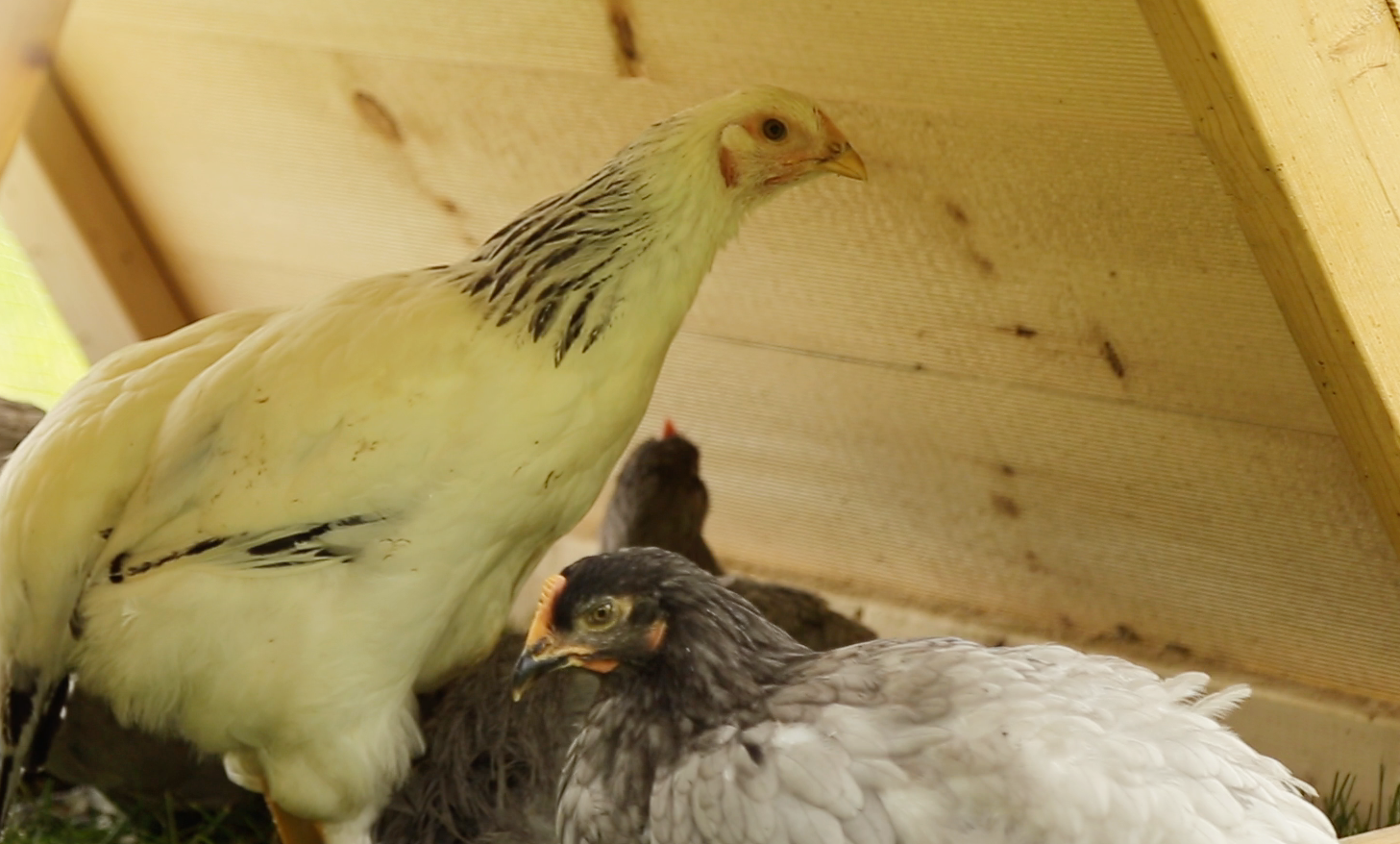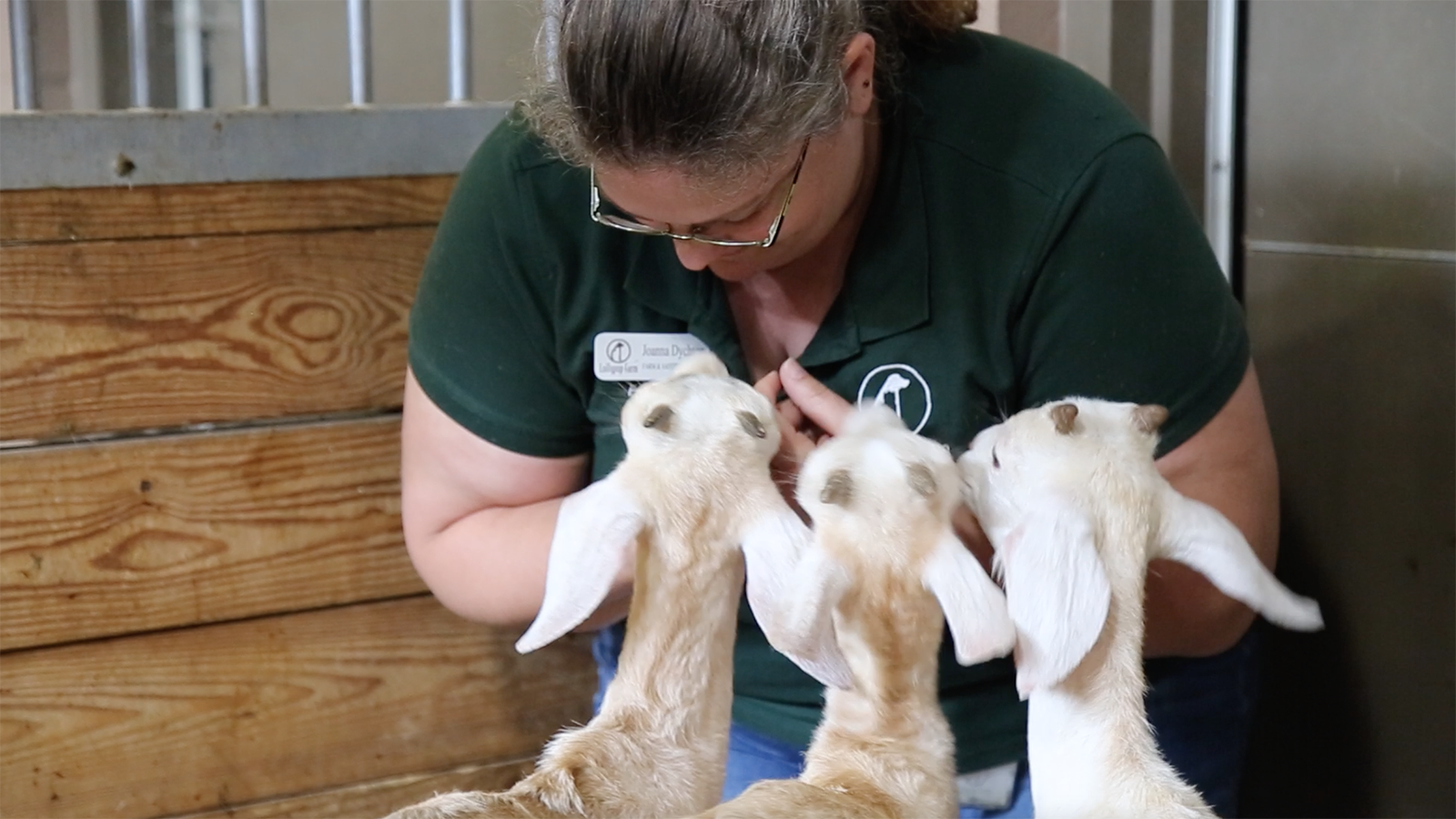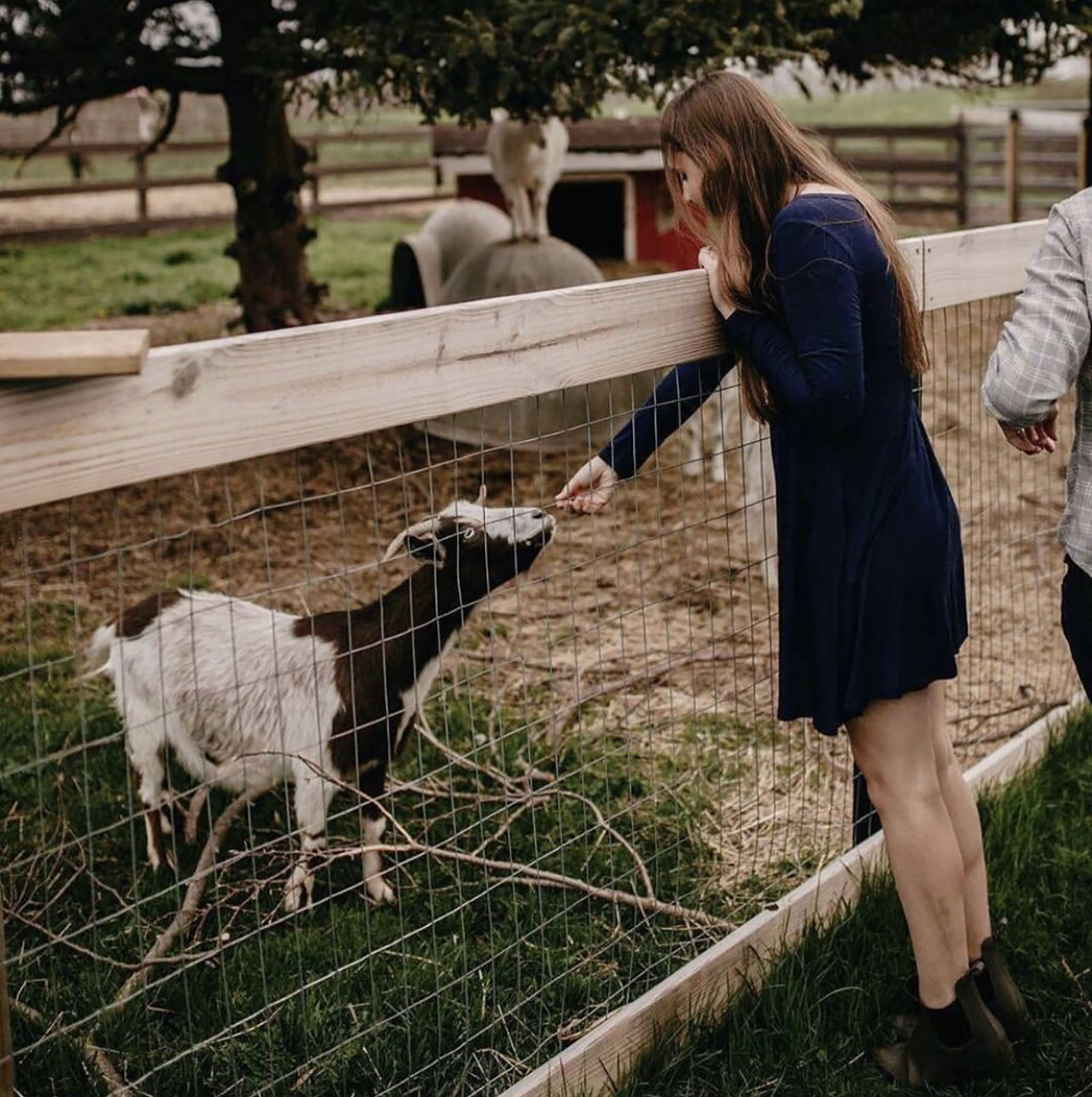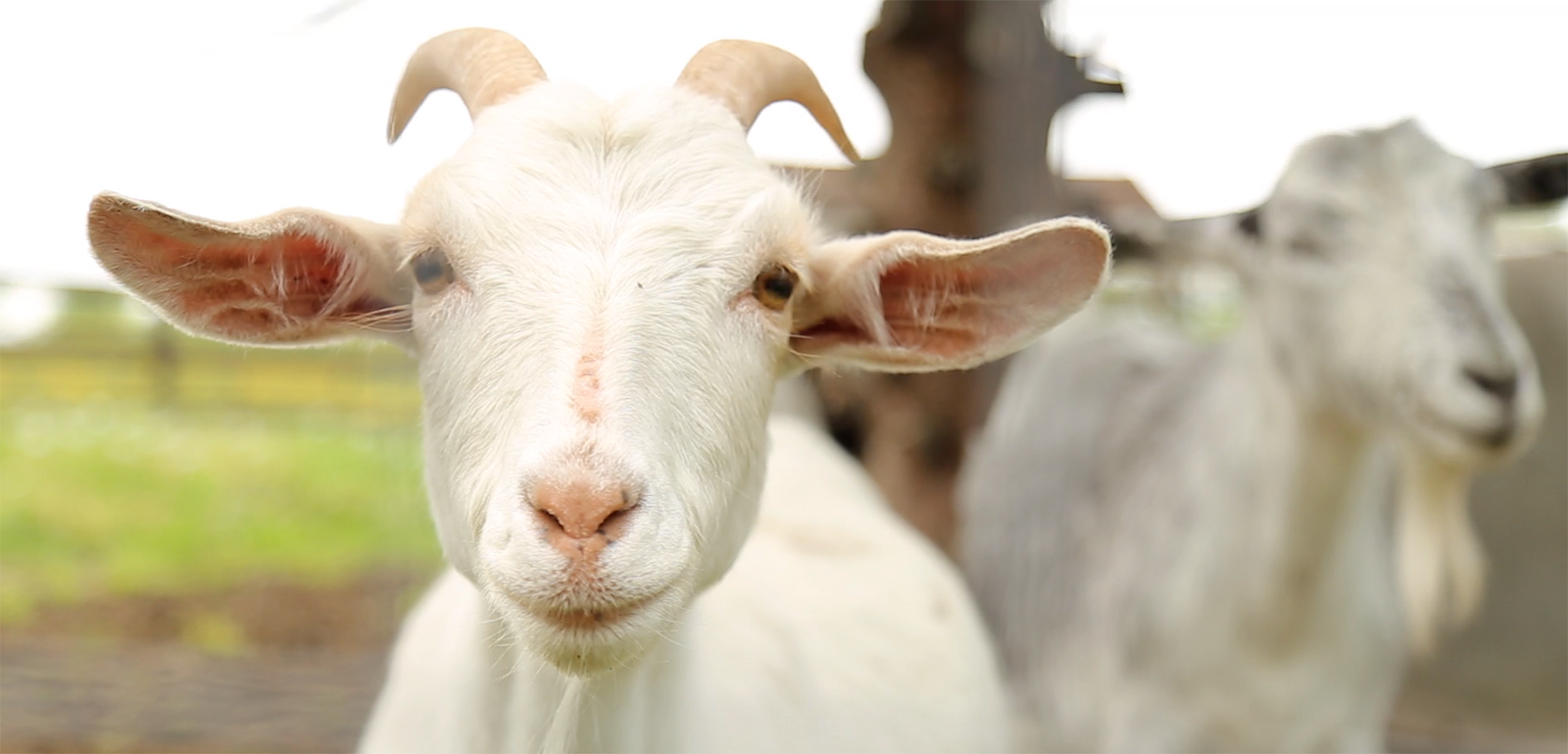Marissa Russo is a contributing writer for Rooted. Born and…
Black Thistle Farm Chicken Rescue started like a well-worn joke — with a lost chicken trying to cross the road. That stranded chicken prompted a friend to reach out to Andrea Martin for help, fearing the chicken would soon be roadkill. The pair tried to bring the chicken to different rescue groups and humane societies, but to no avail. The facilities lacked the equipment to handle a farm animal, and Martin worried the animal would not survive the traffic, other animals, or the upcoming New England winter on its own.
The lack of options prompted Martin to start her own rescue operation, and six years later, she continues to care for lost and neglected chickens. Black Thistle, situated on an acre of land in Clinton, Mass., is now home to 28 birds. She doesn’t refer to the chickens as “pets,” or even “companion animals.” Martin, who is a self-described and practicing animal communicator, chooses to see the rescued fowl as members of her family, fellow contributors to the running of the farm in a sustainable way. Martin says there’s a great need for chicken rescues across the United States thanks to the growth in popularity of raising chickens, which translates into a lot of novices in the hen house who underestimate or misjudge the work required to tend to the birds.
That wasn’t the case with Martin, who grew up on her family’s farm, where they raised chickens for food. She credits her grandfather’s European farming roots for instilling in her family a respect for their animals and an appreciation of them as more than just a future meal. That mindset led to a sense of awareness, prompting Martin’s family to switch to no-kill farming more than 40 years ago. Her family made the transition overnight. The chickens were given free rein to be members of the farm themselves, helping with the garden layout and plants chosen to grow through their own natural habits of eating and ranging. “We work the farm and the land together, and we benefit from what happens together, so it’s a partnership,” Martin says.

Seeing animals as equals serves as just one factor contributing to the growth of animal sanctuaries. Consider it the evolution of our relationship with dogs and cats and a reflection of our growing concern about our food. “Farm animal sanctuaries are growing by the hundreds, if not thousands,” Gene Baur, president and co-founder of Farm Sanctuary, says. “I spoke in Brazil — there are new farm sanctuaries there. I spoke in Sweden — there are new farm sanctuaries there. And they’re growing all over the world.”
Baur explains this growth can be attributed to society’s expanding concern about how people treat what they typically call farm animals: cows, pigs, and chickens. He says that seeing the cruelty of industrial farm operations — like Animal Recovery Mission’s viral investigative video exposing Fair Oaks Farms — increases the recognition of the inhumane systems and presents an opportunity for cultural change in consumption habits. “Animal sanctuaries confront that notion,” Baur says. “Instead of food, they are friends and companions we share the planet with.”
The delineation between which animals are pets and which are food sources is a significant factor in the shifting consciousness around using animals for food, Baur explains. “‘Farm animals’ is easy to understand, but it does put animals in a certain category,” he says. “Sometimes they are even called ‘food animals.’” With the growing availability of plant-based alternatives to meat and milk, Baur says some people are more willing to think about how society treats other animals, specifically regarding their instilled role in our diets. The current consumption model, he says, is a result of structures that reinforce habits of consuming meat and other animal products.
I think we need to make a shift with farm animals — thinking of them as more intellectually advanced and emotionally advanced and understanding that they can experience harm and pain.
People’s reliance on eating farmed animals start from habits formed at childhood, along with the national infrastructure supporting those habits, Baur says. Government subsidization, legislation to revise school lunch programming, and an ingrained national dependency on farmed animals all inhibit the progress of a cultural shift in the treatment of other animals.
About 95% of all farmed animals in the United States are chickens raised for meat, according to Compassion in World Farming, a global organization that works to end cruel factory farming practices for animals facing death by the millions and unhealthy breeding practices every single day. The group also found that 74 billion farm animals are reared for food in the world every year. Vegan and vegetarian homesteaders started working alongside animal sanctuaries and rescue groups to give endangered pigs, chickens, goats, and other farm animals a chance at a happy retirement from such an inhumane past. “Kindness to animals brings joy and enriches our lives,” Baur says. “Mistreating and exploiting them undermines our empathy and humanity.” From his own experience in running Farm Sanctuary, Baur has seen the best and worst ends of the spectrum. “I used to go into slaughterhouses and watch animals being harmed routinely. It affects you, it hurts,” he says. “Watching a newly rescued calf recover from injuries and run and have fun in the pasture brings an unrivaled joy.”
While no-kill homesteaders may not raise animals on their land for food consumption, with some exception for eggs or milk, they do provide a safe haven for the animals they adopt, which then allows sanctuaries and rescues to liberate more farm animals in the process. “I do think there is a relationship with vegan or vegetarian households that love having farm animals, and they just want them as pets,” says Joanna Dychton, the farm and safety manager at Lollypop Farm, Greater Rochester’s humane society. “I think there has been an increase, but I think that’s because it keeps becoming easier and easier. People have more options to take on that lifestyle, to stop eating meat and using animal products, so people can actually enjoy having them as pets.”

Lollypop Farm’s workers care for the farm animals on the 134-acre plot of land outside Fairport, N.Y. Farm animals enter the shelter system through home turnovers, stray and abandonment situations, and cruelty cases, according to Dychton, who has worked at the humane society for over 20 years. Lollypop Farm does not require potential adopters to live a vegan or vegetarian lifestyle, but the humane society does make sure the animals are placed in homes that will serve their best interests. Adopters sign a contract that states the animal will not be used for food, breeding, or any kind of experimentation. A Lollypop Farm staff performs a home check so they can see where the animal will be living.
Jenn Ward, a vegetarian homesteader, adopted three of her goats from Lollypop Farm after they were brought to the shelter as part of a hoarding case with hundreds of other animals. Two of the goats are siblings — Remi and Lydia. The other goat, Willow, gave birth shortly after arriving at the Ward’s home, after becoming pregnant with Noel at the previous property. “I think people are starting to make the connection that just because we’ve labeled something as a pet and something as a food, it doesn’t mean that there’s actually a huge difference with those things,” Ward says. “And if an animal is being abused — it doesn’t matter whether it’s a pet or a farm animal — it deserves to have a good life.”
Ward started practicing vegetarianism as a teenager in high school, but it grew too difficult to maintain in a pro-meat household. Now 25 years old, she switched back to a plant-based diet about three years ago. Around the same time, Ward and her husband, Chris, purchased their 12.5-acre property outside of Rochester, N.Y. and has been growing their own food since. Chris also adopted a vegetarian diet, and today, the couple grows peppers, tomatoes, beans, and herbs in rows of no-till soil with woodchips. Ward also planted several fruit trees on the property and plans to grow 80% of their own food.
This lifestyle change and a lifelong love for animals inspired Ward to adopt their rescued goats. Ward also homes chickens and two horses. “I’m really happy that we’re able to provide our goats and our horses — all of the animals — with the best life that they could have, and I hope that we can see more of a focus on that in the future,” she says. They occasionally use the eggs produced by the chickens, as it is a natural process, but the animals are given safe, enclosed spaces to live their lives without fear of being killed for food.

“It was pretty much a decision that came really easily for me because of my love for animals and my desire to not harm them in any way,” Ward says. “And also, I’ve always just felt like with farm animals and dogs and cats, I have the same relationship with all of them, so it just made sense for me to not eat the animals that we consider edible when I don’t eat my own pets.”
And although plant-based homesteaders are stepping up to adopt farm animals, sanctuaries and rescues still struggle to place some animals. Pot-bellied pigs are one of the most challenging animals to rehome at Lollypop Farm because there is an overpopulation, and misinformation about pigs’ growth habits across social media leads to more home turnovers too, Dychton says. She adds that some potential adopters lack proper education in the costs, care, and attention that pigs require and choose to buy from a breeder because of guarantees about the pig’s size and long-term health. “Unfortunately, it’s the animals that end up paying for it and the people that have to give up their pet,” she says. “They’re in tears because it didn’t work out, and they feel like they failed the animal. And it’s tough. There’s a lot of hurt all over because of those false representations.”
City and town zoning laws also make it difficult for animal sanctuaries and rescues to re-home backyard chickens, especially in urban areas. Laws can prohibit chickens from living within a certain radius of the town or city, and they often end up at shelters like Lollypop Farm. Dychton says people will sometimes raise the chickens from a young age before they can see whether the chicks or male or female. The law especially discriminates against roosters as the crowing can be seen as a nuisance to the public.
It was pretty much a decision that came really easily for me because of my love for animals and my desire to not harm them in any way.
People are buying the chickens without proper knowledge of care, or they are neglected and abused in large scale factory farms. Martin suggests getting the vegan community more involved in the farming industry may help ease these problems. As animal farming becomes less sustainable, there is an impact on both the animals used for food and the environment. Martin says breaking down barriers for organic farming could help preserve farming lands while also saving animals that would eventually be slaughtered.
“I’d like to see this whole movement — this animal rights movement, the environmental movement, the conservation issues, poverty, food insecurity — all come together instead of fighting each other and realize that we all have the answer together, and it’s the same answer,” Martin says. Today, Martin is working on building sustainable landscapes on her farm to feed both humans and animals alike while breaking down some of the barriers between farming and plant-based lifestyles.
“With our farming practices, the chickens that we rescue are free-range, and we have a chickenscape environment that has a lot of fruit trees and berry bushes — raspberries, blueberries, grapes — that assist wildlife, as well as provide amusement and enrichment for the birds,” she explains. “And it helps us too because we also take some of the crops. So it’s a holistic approach to gardening.”
Overall, Ward says the effort put into pet animal rescues — dogs, cats, and even rabbits and hamsters — is becoming more and more popular, but she hopes to see more help for rescued farm animals. Back on her property, Ward’s goats — Willow, Noel, Remi, and Lydia — can be found climbing their goat houses and pulling branches down from a shady tree overhang. The horses roam freely in a large pasture behind the house, and the chickens enjoy alternating between free-ranging through the backyard and being safe in their enclosures. “I think we need to make a shift with farm animals — thinking of them as more intellectually advanced and emotionally advanced and understanding that they can experience harm and pain,” Ward says. “Until we understand that about farm animals, there’s going to be thousands, millions, that are going to need homes. So it’s going to take a huge cultural change for that to happen but I am grateful for the start.”
Marissa Russo is a contributing writer for Rooted. Born and raised all over New York state, she received her master’s degree in Magazine, Newspaper and Online Journalism from the S.I. Newhouse School of Public Communications at Syracuse University and also holds a bachelor’s degree in magazine journalism from SUNY Plattsburgh. As an emerging journalist, Russo has focused her writing on animal rights and welfare.

